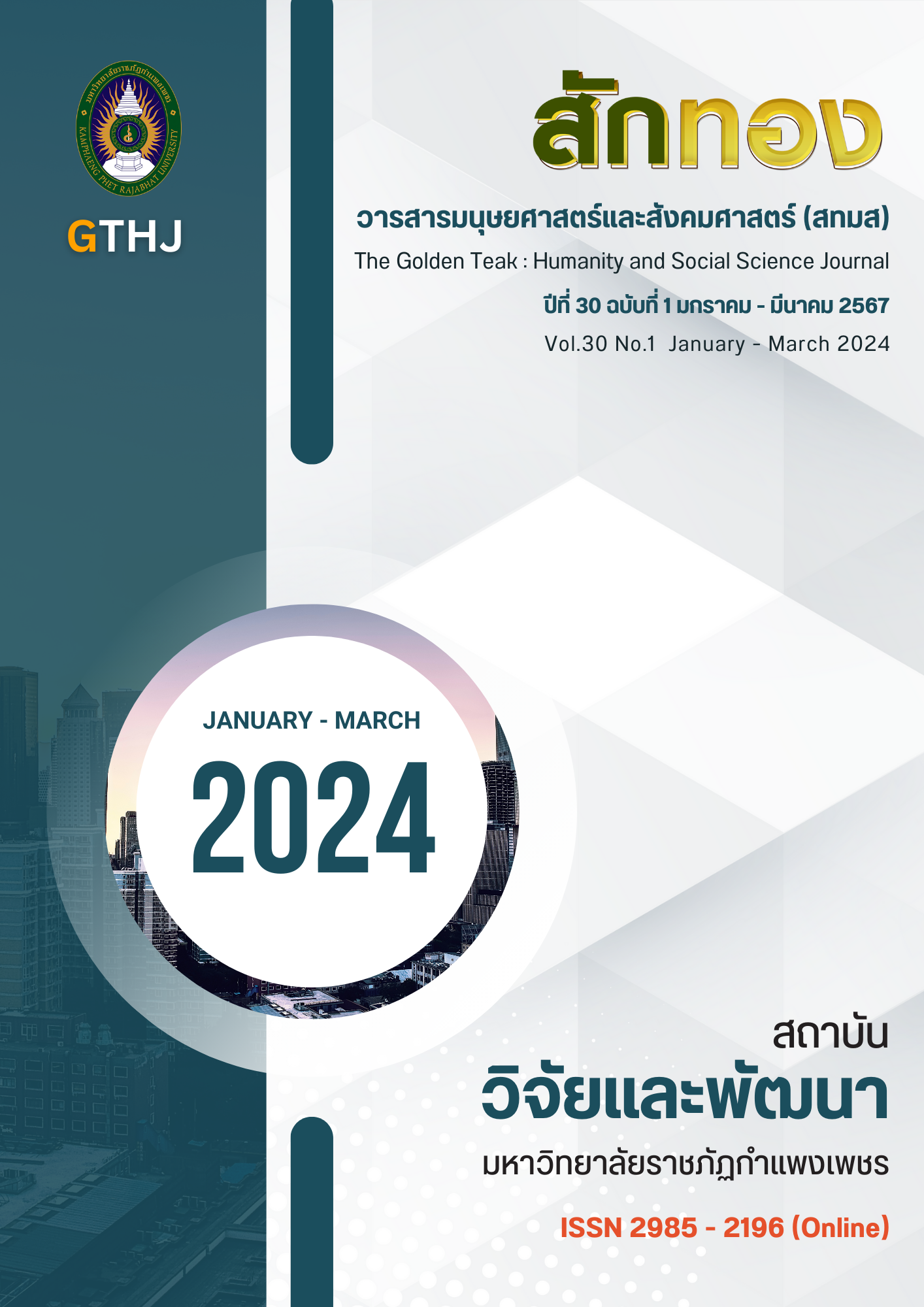การพัฒนารูปแบบการจัดการเรียนรู้ตามแนวทฤษฎีวัฒนธรรมเชิงสังคมเพื่อเสริมสร้างทักษะการสื่อสารภาษาอังกฤษ สำหรับนักเรียนชั้นมัธยมศึกษาตอนต้น
Main Article Content
บทคัดย่อ
การวิจัยนี้มีวัตถุประสงค์เพื่อ 1) สร้างและตรวจสอบคุณภาพของรูปแบบการจัดการเรียนรู้ ดังนี้ 1.1) สร้างและประเมินความเหมาะสมของรูปแบบการจัดการเรียนรู้ตามข้อเสนอแนะของผู้เชี่ยวชาญ 1.2) หาค่าดัชนีประสิทธิผล (E.I) ของรูปแบบการจัดการเรียนรู้ตามแนวทฤษฎีวัฒนธรรมเชิงสังคม 2) ศึกษาผลการใช้รูปแบบการจัดการเรียนรู้ตามแนวทฤษฎีวัฒนธรรมเชิงสังคม โดยศึกษาผลการใช้ ดังต่อไปนี้ 2.1) เปรียบเทียบทักษะการสื่อสารภาษาอังกฤษ ระหว่างก่อนเรียนและหลังเรียน โดยใช้รูปแบบการจัดการเรียนรู้ตามแนวทฤษฎีวัฒนธรรมเชิงสังคม 2.2) ศึกษาทักษะการสร้างสัมพันธภาพระหว่างการเรียนโดยใช้รูปแบบการจัดการเรียนรู้ และ 3) ศึกษาความพึงพอใจที่มีต่อการเรียนโดยใช้รูปแบบการจัดการเรียนรู้ตามแนวทฤษฎีวัฒนธรรมเชิงสังคม เพื่อเสริมสร้างทักษะการสื่อสารภาษาอังกฤษ สำหรับนักเรียนชั้นมัธยมศึกษาตอนต้น โดยดำเนินการตามกระบวนการวิจัยและพัฒนา (Research and Development) 3 ขั้นตอน ได้แก่ 1) ขั้นสร้างและตรวจสอบคุณภาพของรูปแบบการจัดการเรียนรู้ตามแนวทฤษฎีวัฒนธรรมเชิงสังคม โดยผู้เชี่ยวชาญ จำนวน 5 คน และทดลองนำร่องเพื่อหาค่าดัชนีประสิทธิผลกับนักเรียนชั้นมัธยมศึกษาปีที่ 3 ที่ไม่ใช่กลุ่มตัวอย่าง จำนวน 35 คน 2) ขั้นศึกษาผลการใช้รูปแบบการจัดการเรียนรู้ตามแนวทฤษฎีวัฒนธรรมเชิงสังคม โดยทดลองใช้กับนักเรียนชั้นมัธยมศึกษาปีทที่ 3 โรงเรียนวังงิ้ววิทยาคม จำนวน 23 คน โดยวิธีเลือกแบบเจาะจง และ 3) ขั้นศึกษาความพึงพอใจที่มีต่อการเรียนโดยใช้รูปแบบการจัดการเรียนรู้ตามแนวทฤษฎีวัฒนธรรมเชิงสังคม ผลการวิจัย พบว่า 1. ผลการสร้างและหาดัชนีประสิทธิผลของรูปแบบการจัดการเรียนรู้ พบว่า รูปแบบการจัดการเรียนรู้ตามแนวทฤษฎีวัฒนธรรมเชิงสังคม เพื่อเสริมสร้างทักษะการสื่อสารภาษาอังกฤษ สำหรับนักเรียนชั้นมัธยมศึกษาตอนต้น ประกอบไปด้วย 5 องค์ประกอบ คือ หลักการ วัตถุประสงค์ เนื้อหา กิจกรรมการเรียนรู้ และการวัดประเมินผลโดยโครงสร้างของรูปแบบเป็นกิจกรรมการเรียนรู้ที่ประกอบไปด้วย 4 ขั้นตอน คือ ขั้นนำเสนอเนื้อหา (Presentation) ขั้นปฏิสัมพันธ์ซึ่งกันและกัน (Interaction) ขั้นการเสริมศักยภาพ (Scaffolding) และขั้นการใช้ภาษาอังกฤษเพื่อการสื่อสาร (Production) ซึ่งผลการตรวจสอบคุณภาพรูปแบบการจัดการเรียนรู้ที่พัฒนาขึ้น พบว่า มีความเหมาะสมอยู่ในระดับมาก และมีค่าดัชนีประสิทธิผลเท่ากับ .5234 2. ผลการทดลองใช้และศึกษาผลการใช้รูปแบบการจัดการเรียนรู้ พบว่า 2.1 หลังเรียนโดยใช้รูปแบบการจัดการเรียนรู้ที่พัฒนาขึ้น พบว่า ทักษะการสื่อสารภาษาอังกฤษหลังเรียนด้วยรูปแบบการจัดการเรียนรู้ของนักเรียนสูงกว่าก่อนเรียนอย่างมีนัยสำคัญทางสถิติที่ระดับ .01 2.2 ทักษะการสร้างสัมพันธภาพระหว่างการเรียนโดยใช้รูปแบบการจัดการเรียนรู้ที่พัฒนาขึ้น โดยภาพรวมอยู่ในระดับดีมาก 3. ความพึงพอใจที่มีต่อการเรียนโดยใช้รูปแบบการจัดการเรียนรู้โดยภาพรวมอยู่ในระดับมาก
Article Details

อนุญาตภายใต้เงื่อนไข Creative Commons Attribution-NonCommercial-NoDerivatives 4.0 International License.
บทความที่ได้รับการตีพิมพ์เป็นลิขสิทธิ์ของวารสาร สักทอง : วารสารมนุษยศาสตร์และสังคมศาสตร์ สถาบันวิจัยและพัฒนา มหาวิทยาลับราชภัฏกำแพงเพชร
ข้อคิดเห็นใดๆ ที่ปรากฎในวารสารเป็นวรรณกรรมของผู้เขียนโดยเฉพาะ ซึ่งมหาวิทยาลัยราชภัฏกำแพงเพชรและบรรณาธิการไม่จำเป็นต้องเห็นด้วย
เอกสารอ้างอิง
Bailey, A.C. (2013). Understanding Perspectives of English Language Learning and Assessment Practices : A Mixed-Method Embedded Study. A Dissertation for the degree Doctor of Education in Educational Leadership in Curriculum and Instruction.
Bamroongkit, S., Wijakkanalan, S. & Kwangsawad, T. (2019). Blended English Teaching Model Improving Communicative Skills. KKU Research Journal of Humanities and Social Sciences (Graduate Studies), 7(2), 59-69. [In Thai]
Boonprasetpon, P. (2009). The development of an English language instructional model based on experiential learning for higher vocational diploma students. Doctor Thesis, Ph.D., Naresuan University. [In Thai]
Cacic, S. & Kaewurai, W. (2018). The Development of a Learning Management Model Based on Communicative Language Teaching and Task Based Learning to Enhance Communicative Competence for Grade VI Students. Journal of Education Naresuan University, 22(2), 214-226. [In Thai]
Itsaraprida, P. & Thongwiset, T. (2017). Teacher-Student Interpersonal Behavior: Theoretical Model, Assessment, and Research Review. Journal of Education Studies, 45(3), 206-220. [In Thai]
Ministry of Education. (2018). The Basic Education Core Curriculum B.E. 2551 (A.D.2008) : Foreign Languages Department. Bangkok : Ministry of Education. [In Thai]
Naruponjirakul, S. (2017). The Development of an English Instructional Model Based on Scenario-Based Learning to Enhance English Ability and Self-Efficacy of Undergraduate Students. Doctor Thesis, Ed.D., Dhurakij Pundit University. [In Thai]
National Institute of Educational Testing Service. (2019). Ordinary National Educational, Test : O-NET Mattayom 3 Semester 2018. [Online]. Available : http://www.newonetresult.niets.or.th/AnnouncementWeb/Login.aspx [2019, April 30]. [In Thai]
Office of Basic Education Commission. (2014). The Common European Framework of Reference for Languages (CEFR) for Secondary Level. Bangkok : English Language Institute. [In Thai]
Pérez-Sabater, C., & Montero-Fleta, B. (2014). Pragmatic competence and social power awareness: The case of written and spoken discourse in non-native English environments. International Journal of English Studies, University of Murcia, 14(2), 21-38.
Phadvibulya, T. (2006). A Development of a hybrid network technology-enhanced language learning model based on social constructivism approach for promoting EFL learner autonomy. Doctor Thesis, Ph.D., Chulalongkorn University. [In Thai]
Plubpla, P., Jaturanon, W. & Chaisuriya, A. (2017). The development of an English language instructional model based on experiential learning and cooperative learning for promoting communicative competence of sixth grade students. Graduate Studies Journal, 14(64), 229-237. [In Thai]
Pongpetra, S. (2010). Factors Affecting on Interpersonal Relationship with Friends of the Fourth Level, Secondary Grade 4-6 Students at Sarasas Ektra School in Yannawa District, Bangkok. Master of Education, Srinakharinwirot University. [In Thai]
Preedeekun, A., Meejaeng, A. Ngaorangsee, K. & Kaewurai, W. (2011). The development of a listening and speaking English skills instructional model based on communicative competences of Rajabhat University students. Journal of Education Naresuan University, (Special), 155-175.
Salae, A., Rungrattanakul, D., Kaewurai, W. & Wattanathorn, A. (2013). The development of a learning model based on sociocultural theory to enhance English communicative ability for upper secondary school students in three Southern Border provinces. Journal of Education, Prince of Songkla University, Pattani Campus, 27(1),
-135.
Thanapakit, A. (2012, November 22). Thai people are brave Resulting in speaking English second to the world's plum. Daily News, p.8. [In Thai]
Wuttiwongsa, N. (2014). Motivational Strategies: Enhancing English Language Skills. Executive Journal, 34(1), 88-97. [In Thai]
Vygotsky, L.S. (1978). Mind in society: The development of higher psychological process. Cambridge : Haward University Press.


